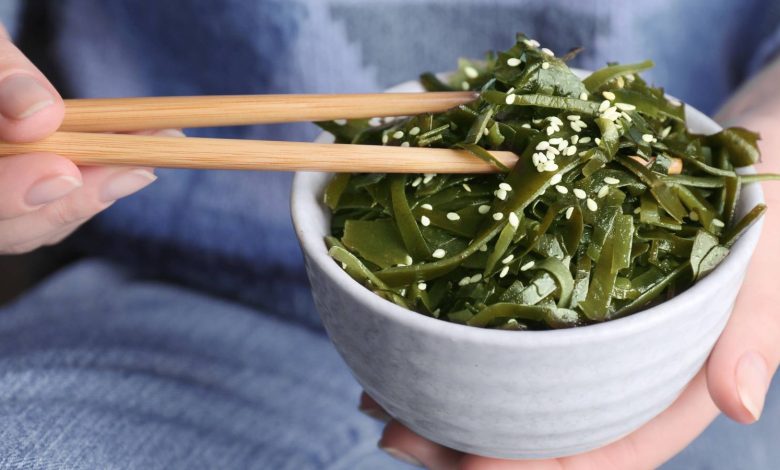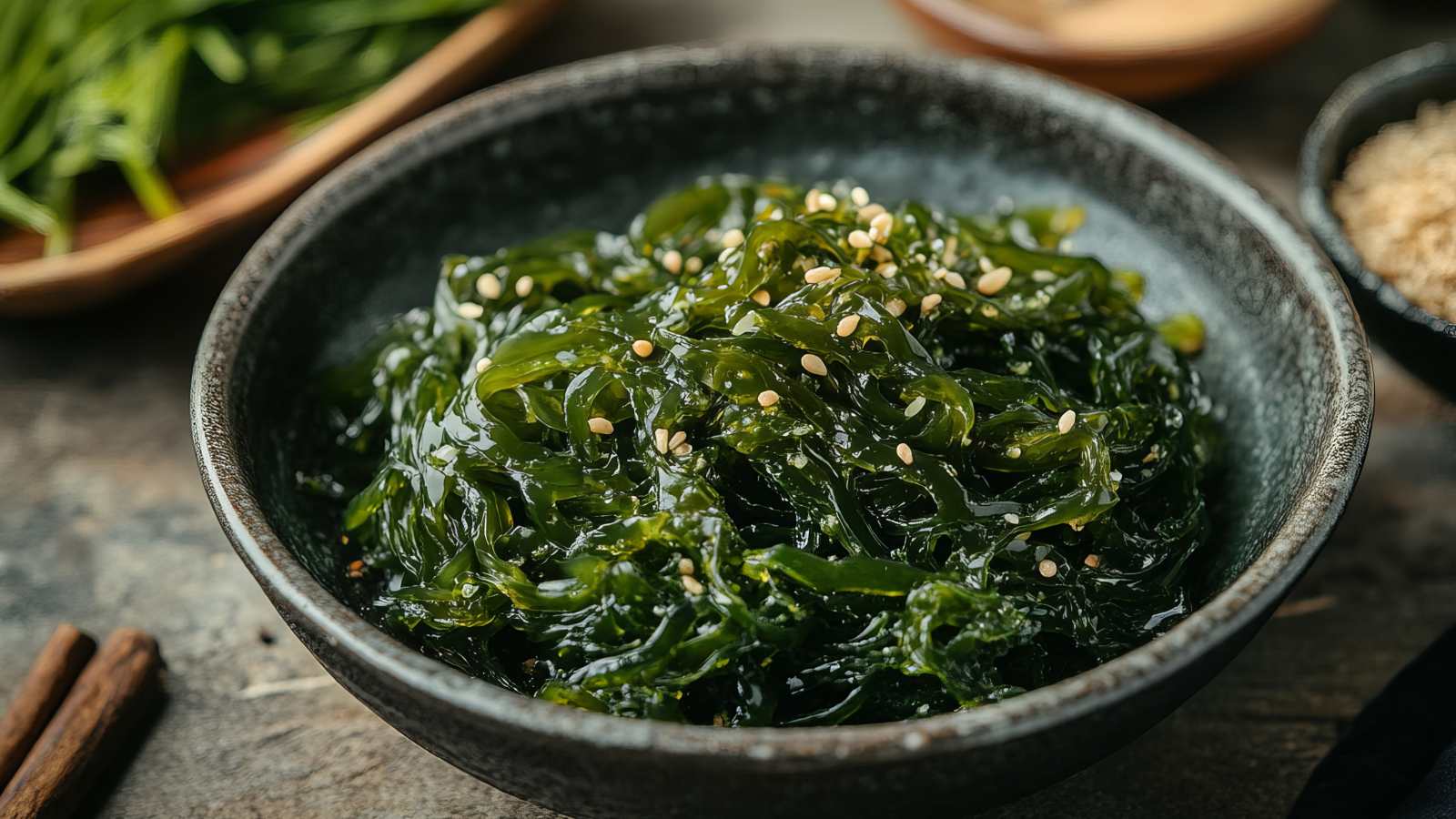
Kelp is one of the popular delicacies of Japan. It is good for your gut and overall well-being. Know all the health benefits of kelp.
People love Japanese cuisine for a variety of reasons, but one of the most popular ones after sushi is kelp, which has a rich flavour and is packed with high nutrients. Kelp is a type of popular seaweed that can be an excellent addition to various cuisines, including chilled salads and savoury soups. It not only tastes great, but it also has a lot of health benefits. It is no surprise that it is gaining popularity around the world. Packed with nutrients and antioxidants, kelp is often considered a superfood of the sea. Know the health benefits of kelp and how to incorporate it into your diet.
What is kelp?
Kelp, known as “kombu” in Japanese, is a large brown seaweed widely used in Japanese cuisine. It grows in shallow, nutrient-rich seawater. It is a key ingredient in dashi, a fundamental soup stock that forms the base of many Japanese dishes such as miso soup, noodle broths, and sauces. Kelp enhances the flavour of many dishes due to the presence of glutamine, a source of savoury taste known as umami, found a study published in the Tokyo Foundation for Policy Research.
Kelp, a type of brown algae, is a rich source of several nutrients and bioactive compounds that can contribute to various health benefits. It contains various nutrients, including iodine, calcium, iron, and vitamins A and C.

5 health benefits of kelp
Here are five reasons why adding kelp to your diet can be beneficial for your health:
1. Reduces inflammation
Kelp, a type of seaweed, contains natural compounds known as carotenoids, which can help combat inflammation, which is linked to many chronic diseases, including arthritis and Alzheimer’s. Carotenoids are also powerful antioxidants that protect our cells from damage, as found in a study published in the Journal of Functional Foods. So, including kelp in your diet could be a tasty approach to improve your health!
2. Regulates thyroid function
Kelp is a natural source of iodine, a trace mineral essential for thyroid hormone production, as found in a study published in the Clinical Chemistry, Immunology and Laboratory Quality Control. The thyroid gland, located in the neck, regulates metabolism, growth, and development of the brain. Iodine deficiency can lead to hypothyroidism, a condition where the thyroid gland does not produce enough thyroid hormone. By providing iodine, kelp can help support thyroid function, ensuring that the body’s metabolism works efficiently.
3. Aids in weight loss
“Kelp is low in calories and fat but high in fibre, particularly a type of fibre called alginate, making it an excellent addition to a weight loss diet. The fibre content promotes feelings of fullness and satiety, lowering appetite and calorie intake, which can aid in weight loss,” says dietician Gauri Anand. However, it is important to note that while kelp can be a helpful addition to a balanced diet, it is not a magic pill. Eating healthy and regular exercise are crucial for sustainable weight loss results.
4. Supports bone health
Kelp contains essential minerals like calcium and magnesium, as found in a study published in the Advances in Food and Nutrition Research, both of which are crucial for bone health. Calcium is the primary building block of bones, while magnesium plays a supporting role in calcium absorption and bone metabolism. “By providing these minerals, kelp can help maintain bone density and reduce the risk of osteoporosis, a disorder characterised by weak and brittle bones. It is important to note that while kelp can contribute to bone health, it is best consumed as part of a balanced diet that includes other calcium-rich food,” explains the expert.
5. Supports cardiovascular health
Kelp is packed with bioactive compounds called fucoidans, as found in a study published in Marine Drugs. These compounds have potential health benefits, especially when it comes to cardiovascular health. Fucoidans are rich in anti-inflammatory and anticoagulant properties, which may help lower blood pressure and reduce cholesterol levels. By reducing inflammation and preventing blood clots, fucoidans may help support cardiovascular health and reduce the risk of heart disease. Incorporating kelp into your diet could be a natural way to improve your heart health.
How to incorporate kelp into your diet?
Here are some easy and effective ways to incorporate kelp into your diet, as suggested by the expert.
1. Kelp snacks
Ingredients:
- 1 sheet of dried kelp
- 1 tablespoon of sesame seeds
- 1 tablespoon of soy sauce
- 1 teaspoon of honey
- 1/2 teaspoon of garlic powder
- 1/4 teaspoon of red pepper flakes
Method:
1. If the kelp sheet is too large, cut it into smaller pieces.
2. In a small bowl, combine sesame seeds, soy sauce, honey, garlic powder, and red pepper flakes.
3. Brush the seasoning mixture evenly over both sides of the kelp sheet.
4. Place the seasoned kelp on a baking sheet or in an air fryer. Bake at 350°F (175°C) for 5-7 minutes, or air fry at 400°F (200°C) for 3-5 minutes, or until crispy.
5. Remove the kelp from the oven or air fryer and let it cool completely before 5. serving.
6. the seaweed snacks in an airtight container at room temperature for up to a week.
2. Kelp and vegetable soup
Ingredients:
- 1 tablespoon of olive oil
- 1 onion, chopped
- 2 carrots, chopped
- 2 stalks celery, chopped
- 4 cups of vegetable broth
- 1/2 cup of dried kelp flakes
- 1 can of chickpeas, drained and rinsed
- Salt and pepper to taste
Method:
1. Heat olive oil in a large pot over medium heat.
2. Add onion, carrots, and celery, and cook until softened.
3. Stir in vegetable broth and kelp flakes.
4. Bring to a boil, then reduce heat and simmer for 15-20 minutes, or until vegetables are tender.
5. Add chickpeas and season with salt and pepper.
3. Kelp stir-fry
Ingredients:
- 1/2 cup of dried kelp flakes
- 1 tablespoon of olive oil
- 1 onion, thinly sliced
- 1 red bell pepper, thinly sliced
- 2 cloves garlic, minced
- 1 inch ginger, grated
- 1 cup of broccoli florets
- 1 cup of snow peas
- 1/4 cup of soy sauce
- 2 tablespoons of rice vinegar
- 1 tablespoon of honey
- 1 teaspoon of sesame oil
Method:
1. Soak dried kelp flakes in cold water for 10-15 minutes, or until softened. Drain and set aside.
2. Heat olive oil in a large skillet or wok over high heat.
3. Add onion, red bell pepper, garlic, and ginger to the hot oil. Stir-fry for 2-3 minutes, or until softened.
4. Add the rehydrated kelp flakes to the skillet. Stir-fry for 1-2 minutes, or until heated through.
5. Add broccoli florets and snow peas to the skillet. Stir-fry for 2-3 minutes, or until vegetables are tender-crisp.
6. Stir in soy sauce, rice vinegar, honey, and sesame oil. Cook for 1 minute, or until the sauce coats the vegetables.
7. Serve with rice or noodles.
4. Kelp salad
Ingredients:
- 1/2 cup of dried kelp flakes
- 1 cup of shredded carrots
- 1/2 cup of cucumber, diced
- 1/4 cup of red onion, thinly sliced
- 1/4 cup of sesame seeds
- 1/4 cup of chopped cilantro
- 1/4 cup of soy sauce
- 2 tablespoons of rice vinegar
- 1 tablespoon of honey
- 1 tablespoon of sesame oil
- 1 garlic clove, minced
Method:
1. Soak dried kelp flakes in cold water for 10-15 minutes, or until softened. Drain and set aside.
2. In a large bowl, combine shredded carrots, diced cucumber, and thinly sliced red onion.
3. In a small bowl, whisk together soy sauce, rice vinegar, honey, sesame oil, and minced garlic to make the dressing.
4. Add the rehydrated kelp flakes to the bowl with the vegetables. Pour the dressing over the salad and toss to coat.
5. Garnish it with sesame seeds and chopped cilantro and serve.

Are there any side effects of kelp?
While kelp offers various health benefits, it is important to be aware of the potential side effects, as explained by the expert.
1. Iodine overconsumption
Kelp is very high in iodine, which is essential for thyroid function, but too much of it can lead to thyroid dysfunction. Overconsumption can cause hyperthyroidism (overactive thyroid) or hypothyroidism (underactive thyroid), particularly in individuals who are sensitive to iodine.
2. Heavy metal contamination
Kelp can absorb heavy metals like arsenic, cadmium, and lead from the ocean. If the kelp is harvested from contaminated water, it may contain harmful levels of these metals, which can pose health risks if consumed for a long time.
3. Digestive issues
Kelp is rich in fibre, which is generally beneficial for digestion, but consuming too much fibre in a short period can lead to digestive discomforts, such as bloating, gas, and stomach cramps.
4. Blood thinning
Kelp contains fucoidan, a compound that may have blood-thinning properties. While this can be beneficial for heart health, it could pose a risk for individuals on blood-thinning medications or those with bleeding disorders.
5. Allergic reactions
Though rare, some individuals may be allergic to kelp or other types of seaweed. Symptoms of an allergic reaction can include itching, hives, swelling, difficulty breathing, or anaphylaxis in severe cases.
Source: healthshots





